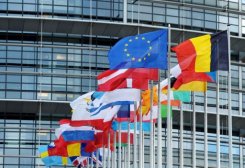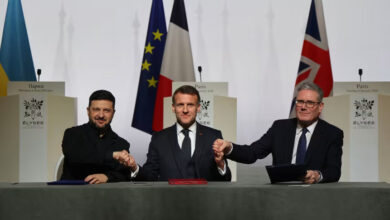
The European Union faces "critical times" and all its members should set aside selfish interests to tackle problems such as immigration and terrorism, the bloc's six founding nations said on Tuesday.
A week after the EU accepted that some members may never go further in sharing sovereignty, as part of the price for keeping Britain in the club, Germany, France, Italy, Belgium, the Netherlands and Luxembourg pledged to pursue "ever closer union" at a meeting in Rome, where they founded the bloc in 1957.
"We are concerned about the state of the European project," the foreign ministers of the Six said in a statement after their talks. "Indeed, it appears to be facing very challenging times. It is in these critical times that we, as founding members, feel particularly called upon."
The meeting was held against the backdrop of deep division in the 28-nation bloc over how to handle the flows of hundreds of thousands of migrants arriving in Europe fleeing war and failing states in the Middle East and North Africa.
It also came a week after Brussels agreed a draft deal with Britain Prime Minister David Cameron that, among other things, reaffirmed the limitations of a treaty commitment to pursue the "ever closer union" of the peoples of Europe, part of a package to help Cameron campaign before a referendum that the EU's second biggest economy should continue its 43-year membership.
While acknowledging that the Union "allows for different paths of integration", the original signatories of the Treaty of Rome declared: "We remain resolved to continue the process of creating an ever closer union among the people of Europe."
Meeting in Italy, which has been in the frontline of a wave of migration to Europe across the Mediterranean, the ministers also stressed the need to overcome divisions on the EU response.
Hungary and Austria this week called for fences on the Macedonian and Bulgarian borders with Greece and between Austria and Slovenia, and several states have called into question the Schengen accord on free circulation inside the EU.
The statement called for better management of the Union's external borders in order to make them more secure while preserving Schengen and not hampering freedom of movement.
It contained no concrete policy proposals, but said Europe "is successful when we overcome narrow self-interest in the spirit of solidarity".




